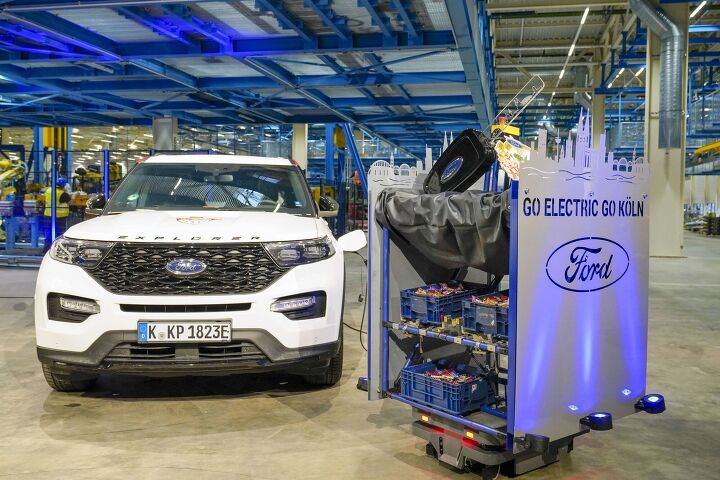Ford Planning More Layoffs Inside Europe


Ford Motor Co. has been trimming back operations in Europe for years and is reportedly planning to cut 4,000 positions in Europe by the end of 2027. The presumed culprit is lackluster interest in all-electric vehicles — models that were supposed to help the company grow inside the region, due to government action, and eventually become the dominant mode of transportation.
This is rather ironic, especially considering that the automaker’s CFO recently indicated that the business intends on running with its preexisting EV strategy while acknowledging the incoming Trump administration has discussed limiting subsidies for all-electric vehicles. But you can’t always believe what you hear, especially when it’s coming from the mouths of executives.
Like many automakers, Ford went into this decade vowing to pivot toward all-electric vehicles by the end of 2030. Analysis were likewise assuring everyone that EVs would reach market parity with combustion vehicles by 2025 and go on to become the dominant mode of transportation. But we are nowhere near those goals. EVs are still priced significantly higher than their combustion counterparts and have not seen the promised demand due to lackluster charging infrastructure and range limitations.
However, those are issues that are less dire in Europe than inside the United States. The EU also has more aggressive emission rules that have made EVs more common, shorter average driving distances, and a charging infrastructure that’s admittedly better than what you’d find in the United States and Canada. Despite this, things haven’t gone according to plan — and not just for Ford.
Most of the large legacy automakers that promised to go entirely electric (e.g. Volkswagen) are starting to announce profit warnings. Much of this is due to the fact that vehicle pricing and market conditions are discouraging people from buying new cars. But the pivot to EVs has been incredibly expensive, with most companies still losing money on all-electric products that are simultaneously being subsidized by the government. In 2023, Ford announced that it would need to eliminate 3,800 as the EV side of the business remained a money pit.
Things don’t appear to have improved for 2024, with Bloomberg confirming 4,000 additional job cuts focused on Ford facilities in Germany and the United Kingdom. This amounts to about 14 percent of its total European workforce and will coincide with scaling back assembly on all-electric versions of the Explorer and Capri.
“What we lack in Europe and Germany is an unmistakable, clear policy agenda to advance e-mobility,” John Lawler, Ford’s vice chairman and CFO, stated.
That’s executive-speak for wanting taxpayers to continue footing the bill for EVs and making the government mandate the pivot to all-electric vehicles — something many automakers assumed would be more profitable. But Ford would likewise accept lessened emission rules, allowing them to field vehicles that didn’t have to adhere to such rigid tailpipe regulations, if it cannot get what it wants in terms of electrification.
[Image: Ford]
Become a TTAC insider. Get the latest news, features, TTAC takes, and everything else that gets to the truth about cars first by subscribing to our newsletter.
Source: The Truth About Cars
Recent Posts
Robotaxi Expert Suggests Elon Musk Will Try to ‘Fake’ Cybercabs in June
Can the Tesla CEO deliver on his promises?
Apple Will Fully Encrypt RCS Messages Between Androids and iPhones
Texting a Green Bubble will feel as native as engaging another iPhone user on iMessage.
Severance‘s New Episode Has Its Origins in The Twilight Zone
Apple TV+'s show borrows an episode title—'The After Hours'—and some Easter eggs from a 1960…
Ill-Fated Moon Lander Unexpectedly Woke Up and Sent One Last Message
A new 360-degree image captures the craft's unfortunate descent toward the Moon.
Will Trent Season 3 Episode 10 Spoilers: Was An Elite Society Responsible For a Teenage Girl’s Murder?
Trying to fit in as a teenager was brutal. I can’t imagine growing up in…
HomeKit Weekly: Aqara LED Bulb T2 is a versatile smart bulb with Matter support and advanced Zigbee features
Aqara LED Bulb T2 is the company’s latest smart lighting option, bringing a nice combination…